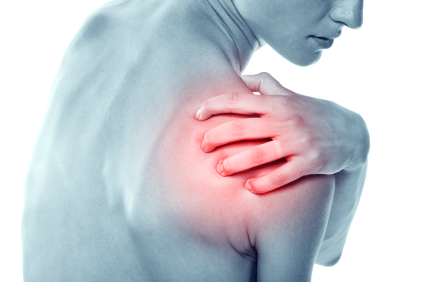What causes shoulder pain?

The shoulder is the most mobile joint in the human body. The joint includes four tendons that hold muscle to bone. Together, these four “rotator cuff” tendons stabilize the upper arm bone to the shoulder socket and allow a wide range of motion in the shoulder.
You should see a Dr. Shepard if you experience the following:
1. Inability to carry objects or use the arm
2. Injury that causes deformity of the joint
3. Shoulder pain that occurs at night or while resting
4. Shoulder pain that persists beyond a few days
5. Inability to raise the arm
6. Swelling or significant bruising around the joint or arm
7. Any other unusual symptoms
Types of shoulder pain:
Bursitis: The most common diagnosis in patients with shoulder pain is bursitis or tendonitis of the rotator cuff. Bursitis is an inflammation of a fluid-filled sac, or bursa, that lies between tendon and skin or between tendon and bone. Normally a bursa protects the joint and helps make movement more fluid.
Rotator Cuff Tendonitis: Tendonitis is when tendons become compressed under the rigid bony arch of the shoulder. The compressed tendons become inflamed or damaged and cause pain. This can occur from general wear and tear, as you get older, an activity that requires constant shoulder use like baseball pitching, or an injury.
Arthritis: Shoulder arthritis is less common than knee and hip arthritis, but when severe may require a joint replacement surgery. Arthritis is a gradual narrowing of the joints and loss of protective cartilage in the joints about the shoulder.
Rotator Cuff Tear: A Rotator cuff tear occurs when the tendons of the rotator cuff separate from the bone. Surgery is sometimes necessary for this condition.
Frozen Shoulder: Also called ‘adhesive capsuliitis,’ this is a common condition that leads to stiffness of the joint. Physical therapy and stretching are extremely important aspects for treatment.
Calcific Tendonitis: Calcific tendonitis is a condition of calcium deposits within a tendon — most commonly within the rotator cuff tendons. Treatment of calcific tendonitis depends on the extent of symptoms.
Labral Tear: A Bankart lesion is a type of labral tear most commonly due to dislocation of the joint. Bankart lesions cause problems of persistent instability and shoulder pain.
Shoulder Instability: Instability is a problem that causes a loose joint. Instability can be caused by a traumatic injury (dislocation), or may be a developed condition.
Shoulder Dislocation: A dislocation is an injury that occurs when the top of the arm bone becomes disconnected from the scapula.
Shoulder Separation: Also called an AC separation, these injuries are the result of a disruption of the acromioclavicular joint. This is a very different injury from a dislocation!
SLAP Lesion: The SLAP lesion is also a type of labral tear. The most common cause is a fall onto an outstretched hand.
Biceps Tendon Rupture : A proximal biceps tendon rupture occurs when the tendon of the biceps muscle ruptures near the joint.
How can Dr. Shepard help my shoulder pain?
The treatment of shoulder pain depends entirely on the cause of the problem. Therefore, it is of utmost importance that you understand the cause of your symptoms before embarking on a treatment program.
Dr. Shepard looks at your overall health, focusing not only on your shoulder, but also on your shoulder and upper back mechanics. This integrated approach helps determine the best treatment for your shoulder pain. To help identify the cause of your problem, you and your bloomington il chiropractor will discuss your symptoms and previous injuries, including recreational and work related physical activities.
Dr. Shepard is uniquely qualified to restore the health of your shoulder, due to his specialization in Active Release Technique (A.R.T.). A.R.T is a deep muscle therapy that relieves tension and promotes proper muscle motion, while reducing scar tissue formation, muscle imbalance, and nerve entrapments. Every A.R.T session is actually a combination of examination and treatment.
Dr. Shepard may recommend other types of treatment for relieving your shoulder pain. These may include stregthening exercises, shoulder stretches, moist heat, or ice.
Why live in pain? Call our office at 309-585-0382 and make an appointment to determine what is generating your pain.
